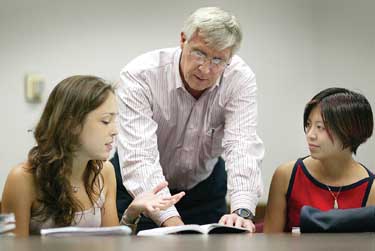University of Paris students get first-hand lessons in Chicago School of Economics
By William HarmsNews Office
 Allen Sanderson, Senior Lecturer in Economics, instructs two of his French exchange students, Agnes Deschins (left) and Sylvie Chhom, who are visiting campus this summer and are enrolled in economics courses at the University. |
Sanderson asked his French students––who are studying on campus this summer as part of Chicago’s study abroad exchange program with the University of Paris––to examine the proposition that a recent drop in the sales of French wine in the United States was related to American resentment over French reluctance to support the war in Iraq.
“We don’t like you,” Sanderson said in reference to an attitude held by some Americans. “And as a result, we don’t buy your wine. But is this a reasonable way to read the figures?”
As he did some computations at the board, students listened as he explained that other factors, such as an increase in the price of the Euro, which would increase the cost of French wine, a continuing recession-like economy in the United States, and the possibility that wine might be available from other sources, could be behind the sales drop rather than just tension between nations.
The students listened, wrote notes, and then paused to eat some cake Sanderson had brought to the class. As they passed around the plates, Sanderson distributed brochures on Chicago attractions and suggested entertainment for the group of nearly 20 students gathered in a seminar room on the first floor of the Social Sciences Research Building.
Despite some temporary hard feelings brought on by the war, students said they found the reception of Americans warm during one of their breaks.
“The Americans have been very friendly,” said Olivia Lau. She said the experience of being in Chicago also has helped her expand her English. “I’ve learned quite a bit of vocabulary.”
During the break, the students talked about enjoying the relative informality of American instruction as well as the opportunity to learn more about American economics.
“Here, there is not so much distance between the professor and the students as there is in France,” said Jean Baptiste Chambon. In French universities, many classes are large lectures, which provide little opportunity for interaction between students and faculty. At Chicago, the students have been asking questions and responding to questions from their teachers.
“I also like the fact that we get so many examples of what Mr. Sanderson is talking about. In France, much of our instruction is more theoretical,” Chambon added.
The students are part of a two-year-old study abroad exchange program that emphasizes economics for French undergraduates who attend the University of Paris. The program brings students to Chicago for the summer and sends University students to Paris during the Winter Quarter to study.
In addition to taking the class with Sanderson, students also enroll in either macroeconomics or microeconomics classes offered through the Graham School of General Studies, said Dan Bertsche, Assistant Director of the France Chicago Center. While in Chicago, the students learn about the American economy and gain a perspective on the famous free market Chicago School of Economics.
While in Paris, Chicago students learn about banking, industrial regulation and the European perspective on economic issues from University of Paris faculty. Members of that faculty also teach at Chicago’s Paris Center, where the economics program is an important component of the University’s curriculum for College students.
“Great universities should provide their students with rigorous opportunities to learn more about other cultures and other civilizations in a direct and immediate way, and we are delighted we have been able to fashion a successful partnership with our colleagues at the University of Paris,” said John Boyer, Dean of the College and the Martin A. Ryerson Distinguished Service Professor in History.
Both groups of students learn much about economics, as taught in Chicago and in Paris, but they also learn about another academic tradition, another university and another major city, Boyer said.
“The Chicago faculty has had a long-standing conviction that a knowledge of other cultures is a key component of a true liberal education, and programs such as the current exchange help us to provide fruitful opportunities to our students to pursue their concentration-level courses in a completely different cultural environment,” Boyer said.
The program has been satisfying for faculty as well, and Sanderson said he has learned from his students.
“The students are bright, just like our Chicago students. They do their reading assignments and participate in class,” Sanderson said.
“The exchange provides both sides with a chance to get new perspectives on how each country approaches similar problems, such as unemployment,” he said. “We’ve also learned about the role of strikes and state ownership in France, which is different from the United States.”
In addition to their coursework, the students also take in some of Chicago’s financial sites, including the Chicago Board of Trade and the Chicago Federal Reserve Bank.
The practical experience of seeing the American economy in action and the knowledge students pick up in the classroom will be important in improving relations between the United States and Europe, particularly France, program organizers said.
“Exchanges such as that between Chicago and Paris also are long-term investments in trans-Atlantic friendships and international understandings on a personal level. We will need many more, and certainly not fewer, of such relationships between Europe and the United States in the coming century,” Boyer said.
![[Chronicle]](/images/sidebar_header_oct06.gif)